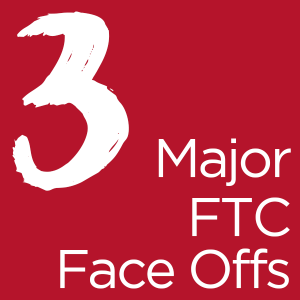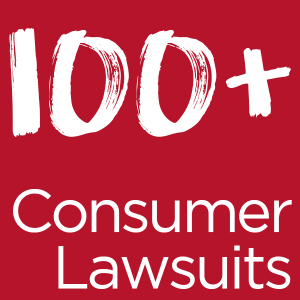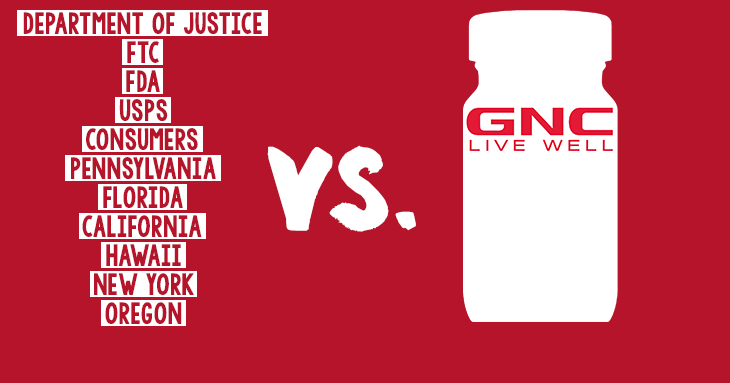
Best Reader Tips of 2021
This year reader tips led to dozens of ad alerts, as well as a complaint to regulators.
False advertising and wrongful death are among a plethora of allegations filed against the supplement retailer.
GNC is pushing consumers to have the “courage to change” in its latest ads. But its history of legal challenges and enforcement actions concerning its marketing may leave consumers wondering if the world’s largest retailer of supplements will adhere to its own advice. The Pittsburgh-based supplement giant, which has more than 9,000 store locations worldwide, has been the subject of numerous federal and state actions and has been named in more than 100 consumer lawsuits. The chief issues? The advertising, safety, and efficacy claims of a range of products from weight-loss to muscle-building supplements it has manufactured and/or sold on its shelves, including such popular products as Sensa, Jack3d and Hydroxycut.
Under the 1994 Dietary Supplement Health and Education Act (DSHEA), the government has limited regulatory authority over the supplement industry and the marketing of such products. Unlike pharmaceuticals, federal agencies do not approve supplements, nor require supplement makers to submit substantiation for marketing claims before they sell their products. Instead, companies are responsible for ensuring that the products they manufacture and/or distribute are safe.
Here’s a rundown of key legal actions taken against GNC Holdings, Inc — which amid a sharp decline in sales is continuing its efforts to rebrand itself — and the products it has sold:
Department of Justice (DOJ) actions against GNC date back to 1984, when, coming to the aid of the FDA, it brought a criminal complaint against the retailer and three of its officers for marketing and selling Gammaprim (oil of evening primrose) as a drug that could treat hypertension, arthritis, multiple sclerosis and psychosis. GNC pled guilty to four counts of misbranding and settled for $10,000.
Ten years later, in 1994, the DOJ brought a 19-count complaint against GNC alleging that it had violated two FTC consent orders (one from 1969/70 and another from 1989) relating to its marketing of supplements that it claimed could build muscle and burn away fat fast, as well as vitamins it claimed could treat tiredness and other energy issues. The case ended with GNC entering into a $2.4 million consent decree.
One of the most recent actions against GNC Holdings Inc. was brought by DOJ in 2016 following an investigation by the FDA, the U.S. Attorney’s Office for the Northern District of Texas, and the Consumer Protection Branch of the Department of Justice’s Civil Division. The investigation centered on misbranded supplements containing the dangerous stimulant dimethylamylamine (DMAA) that was manufactured by USPLabs and sold at GNC locations. In a sweeping agreement with DOJ, the company committed to more aggressive steps to prevent illegal products and ingredients from being sold in its stores and removing them more quickly from its shelves.
 The FTC and GNC first entered into a consent order in 1969 over the company’s false and deceptive marketing of Geri-Gen Liquid/Tablets and Hemotrex that it claimed could treat tiredness, listlessness and feelings of being rundown. The order required GNC, among other things, to clearly disclose in advertisements that the majority of people with such symptoms would not benefit from using these supplements.
The FTC and GNC first entered into a consent order in 1969 over the company’s false and deceptive marketing of Geri-Gen Liquid/Tablets and Hemotrex that it claimed could treat tiredness, listlessness and feelings of being rundown. The order required GNC, among other things, to clearly disclose in advertisements that the majority of people with such symptoms would not benefit from using these supplements.
In 1984, the FTC filed another lawsuit against GNC alleging it made false and unsubstantiated claims that its “Healthy Greens” supplement could reduce the risk of cancer. GNC agreed to pay $600,000 to settle that lawsuit and additional charges regarding false weight loss, muscle growth and anti-aging claims about six other supplements. The agreement, however, did not hold GNC to claims on package labels or promotional inserts about products sold in its stores by third parties. One FTC commissioner who opposed the order said it “leaves GNC free to sell products that it knows are deceptively labeled.” (More on that later)
The FTC’s next major action came a decade later, charging that, not only had GNC failed to abide by the previous agreements, but that the company had also failed to substantiate disease-treatment, weight-loss, muscle-building and endurance claims for more than 40 products. One of these products was “Sleepers Diet,” which claimed it could help users lose weight during their sleep. Another was “New Zealand Green Lipped Mussel Extract” that it claimed could cure, prevent and treat any disease. The company settled the case in 2000 by agreeing to pay $2.4 million.
At least four other FTC actions concerned companies whose products were sold at GNC: These include Liverite Products, which were marketed as being able to prevent liver disease; Nature’s Bounty for deceptive weight-loss, body- building, and disease-treatment claims (some of which were jointly published in GNC’s catalogue); and Sensa for its deceptive “sprinkle, eat and lose weight” claims.
 The United States Postal Service (USPS) has brought action against GNC for false representations of more than a dozen products dating back at least to the ‘80s.
The United States Postal Service (USPS) has brought action against GNC for false representations of more than a dozen products dating back at least to the ‘80s.
In 1982, the postal service found that GNC had falsely represented that scientific and clinical tests had shown its Starch Block would allow consumers to eat more than a pound of pasta without absorbing starch calories.
USPS took action again in 1984 against more than a dozen products related to weight-loss, muscle-builder, memory and emotional support supplements for which GNC agreed to change the advertising claims and refund customers. Products included Inches BeGone, Mental Acuity Formula and Challenge Maximum Body Builder.
 Agencies in at least a half-dozen states have investigated and/or taken action against GNC or products sold in its stores. These include Pennsylvania (1989), Florida (2001/2), California (1983, 2003), Hawaii (2013), New York (2015), and most recently Oregon (2015). The actions ranged from settlements with Florida over expired vitamin pills, to warnings from Hawaii about illegal sales of OxyElite Pro that contained DMAA, as well as California about supplements tainted with an illegal anabolic steroid.
Agencies in at least a half-dozen states have investigated and/or taken action against GNC or products sold in its stores. These include Pennsylvania (1989), Florida (2001/2), California (1983, 2003), Hawaii (2013), New York (2015), and most recently Oregon (2015). The actions ranged from settlements with Florida over expired vitamin pills, to warnings from Hawaii about illegal sales of OxyElite Pro that contained DMAA, as well as California about supplements tainted with an illegal anabolic steroid.
In Oregon, the state filed a lawsuit alleging GNC was selling supplements adulterated with picamilon, a prescription drug, and BMPEA, an amphetamine, both of which the state alleges are potentially dangerous ingredients that don’t meet the definition of a dietary ingredients. The case is still pending.
In the New York case, GNC reached an agreement with the attorney general’s office requiring that it implement new testing standards nationwide to ensure the purity of its products. An investigation by the AG found that many store brand supplements did not contain the plant-based ingredients listed on the label and actually contained allergens and other ingredients that were not disclosed. The New York investigation and action led to the formation of a coalition of state attorneys general who are further investigating the herbal supplement industry to ensure that manufacturers and retailers comply with the law.
The FDA and GNC have clashed over the marketing of supplements as drugs, fought about product recalls, and locked horns over product seizures.
The FDA’s most recent major action was in 2013 when it seized DMAA products that the agency said were being illegally stored in a GNC warehouse (See USA Slapdowns above for further info).
The agency has also warned GNC about various supplements illegally marketed with disease-treatment claims. It has also issued warnings, seized or recalled products that contained and/or were adulterated with unsafe ingredients, including such top sellers as Hydroxycut, which the agency said was associated with the potential risk of liver disease and heart attacks.
 In the past two decades, GNC has been sued more than 100 times by consumers on a range of issues from allegations of wrongful death to personal injury to false marketing and failure to warn. Of these individual cases at least 60 involved false advertising or marketing, three involved deaths and 25 involved illnesses.
In the past two decades, GNC has been sued more than 100 times by consumers on a range of issues from allegations of wrongful death to personal injury to false marketing and failure to warn. Of these individual cases at least 60 involved false advertising or marketing, three involved deaths and 25 involved illnesses.
In addition, there were so many product liability and false advertising lawsuits regarding products with ingredients such as DMAA, Ephedra, and L-Tryptophan (all of which were banned from sale by the FDA because of significant adverse health effects) that they became part of multi-district litigation cases (MDL), which is a legal procedure in which all similar lawsuits are transferred to one court to be heard together. The products at issue in these MDLs include Sensa, Hydroxycut, TriFlex, Testofen, OxyElite Pro and Jack3d.
Consumer cases of note include prospective Baltimore Orioles pitcher Steve Bechler who died after taking three Ephedra pills (that 2003 case settled); Phillies bullpen pitcher J.C. Romero who was suspended after testing positive for a banned substance after taking the supplement 6-OXO Extreme (that case settled in 2012); Kim, Khloe and Kourtney Kardashian, spokeswomen for Quick Trim, who were sued along with the company and GNC in a false advertising class-action lawsuit alleging bogus weight-loss claims (that case settled in 2013, though the approval of the settlement was appealed ), and more than 40 cases relating to DMAA alleging a range of issues including wrongful death, failure to warn, and/or product liability.
It is also facing a lawsuit alleging civil violations of the Racketeer Influenced and Corrupt Organizations Act (RICO) and false advertising regarding the marketing of testosterone booster products with Testofen. The case, which alleges, among other things, that GNC and other defendants falsely represented that the products were clinically proven to increase free testosterone levels, is still pending in federal court in California.
In response to a request for comment about the multiple governmental actions and consumer lawsuits and how customers can be assured that the products GNC sells are safe and effective, the company told TINA.org:
GNC brand products are manufactured, packaged, tested, and distributed in accordance with the highest industry standards and in conformance with the U.S. Food and Drug Administration’s applicable laws.
(Click here to read GNC’s full statement to TINA.org.)
GNC revenues and shares fell in 2016 and its CEO resigned. The company reported more than $200 millions in losses and a drop in sales in company-owned stores and franchise locations last year. Its leadership noted the decline in consumer confidence in the safety of supplements as a challenge amid government scrutiny.
Supplements continue to be big business, with Americans spending more than $30 billion on the products, despite studies that show limited benefits. Consumers should be vigilant, advocates advise.
“The government’s limited oversight of supplements, coupled with the legal history of retailers such as GNC clearly shows that consumers must use caution,” said Bonnie Patten, executive director of TINA.org. “Consumers may want to consult with a health care provider before taking any supplement.”
For more of TINA.org’s coverage of dietary supplements click here. For more about the safety of supplements click here.
This year reader tips led to dozens of ad alerts, as well as a complaint to regulators.
Supplement MLM takes down dozens of deceptive claims following TINA.org investigation.
TINA.org files brief urging court to deny final approval of settlement that is unfair to consumers.


